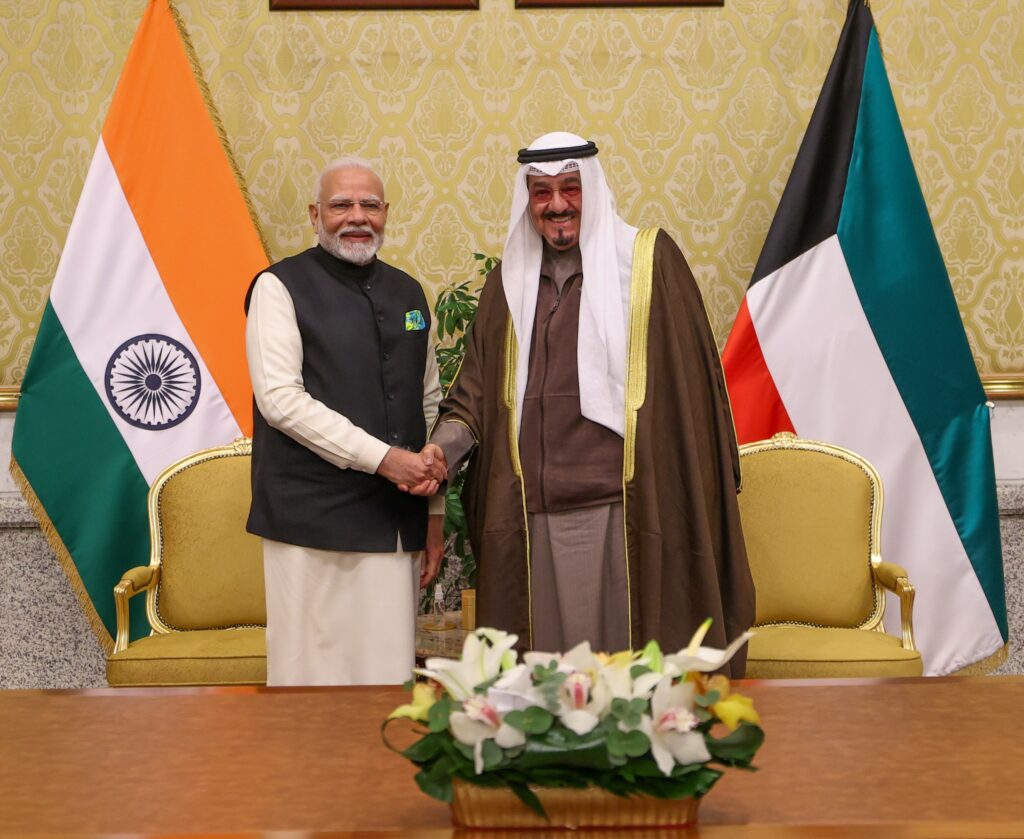
- Kuwait is a very prominent economic partner for India, with bilateral trade reaching a historic $10.47 billion in the year 2023-2024.
- Kuwait has agreed to join the International Solar Alliance, reflecting the growing alignment between the two countries on global sustainable energy initiatives.
- India is also exploring defence partnerships in the region, seeking alternative defence markets. Kuwait could play a significant role in this endeavour.
Prime Minister Modi made a historic trip to the Gulf country of Kuwait, becoming the first Indian Prime Minister in 43 years to visit the nation. This visit is part of India’s continuous efforts to enhance its presence and diversify its relationships with West Asian countries. Notably, over 1 million proud Indians reside in Kuwait, constituting almost 20% of the country’s population.
The Kuwaiti counterparts equally reciprocated the excitement surrounding this visit, as the Kuwaiti government showed great enthusiasm in welcoming Prime Minister Modi also PM Modi was presented with the highest Kuwaiti honour of “The order of Mubarak Al – Kabeer”.
During his visit, Prime Minister Modi addressed the Indian community in Kuwait at the “Hala Modi” event. Additionally, Prime Minister Modi attended the opening ceremony of the Gulf Arabic Football Tournament. On the second day of his visit, he toured a labour camp to meet and address the Indian labourers working and residing in Kuwait.
Kuwait is a very prominent economic partner for India, with bilateral trade reaching a historic $10.47 billion in the year 2023-2024. Simultaneously, India’s exports to Kuwait surged to $2 billion, while investments from Kuwait into India reached $10 billion. Kuwait is also India’s sixth-largest supplier of crude oil, meeting 3% of India’s overall energy demand.
Traditionally, India-Kuwait relations have been driven by energy cooperation. However, under Prime Minister Modi’s vision, the relationship has been diversified. There is now a strong willingness on both sides to expand collaboration beyond energy into areas such as defence, culture, and other potential sectors where both nations can profit economically and gain strategic benefits.
To solidify this diversification, both countries have agreed to elevate their relationship to one of strategic importance. Several agreements were signed during the visit: one in the field of defence, another in sports, and a third in cultural cooperation.
The cultural agreement will span from 2025 to 2029, while the sports agreement focuses on excellence sharing and collaboration starting from 2025 to 2028. Additionally, Kuwait has agreed to join the International Solar Alliance, reflecting the growing alignment between the two countries on global sustainable energy initiatives.
India views West Asia as a land of opportunity, particularly because key countries in the region, such as Kuwait, Saudi Arabia, and the UAE, are actively working to diversify their economies. These nations aim to reduce their dependence on energy exports and boost investments in other sectors.
India sees this as an opportunity for Indian companies to invest in Kuwait, fostering mutual benefits. Moreover, India is also exploring defence partnerships in the region, seeking alternative defence markets. Kuwait could play a significant role in this endeavour.
This strategic approach underlines why India has been focused on strengthening its relationships with West Asian nations, aiming to deepen ties across multiple domains for mutual growth and strategic advantages.
References:
- https://www.ndtv.com/india-news/india-kuwait-sign-pact-to-strengthen-cultural-defence-cooperation-7309416
Aayush Pal is a freelance writer on contemporary geopolitical developments. The views expressed in his work are entirely his own.
